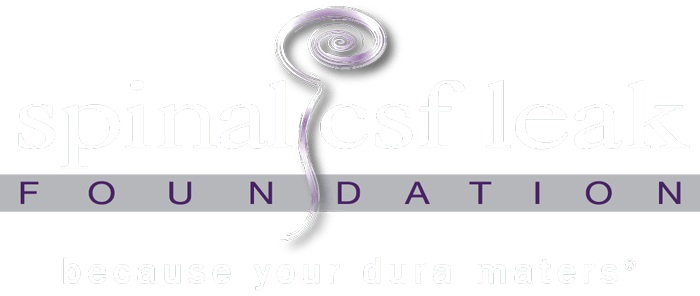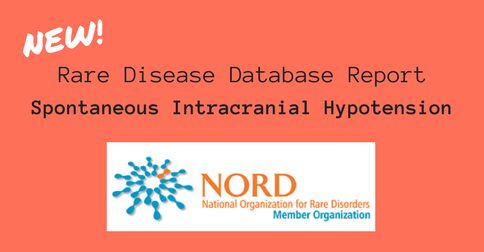The National Organization of Rare Disorders (NORD) has a widely referenced library of more than 1,200 reports on rare disorders that provide important information written at a level suitable for patients and their families. NORD has recently released a new Rare Disease Database Report on spontaneous intracranial hypotension, also known as spontaneous spinal cerebrospinal fluid (CSF) leak. Here is their press release: rarediseases.org/nord-publishes-report-on-spontaneous-intracranial-hypotension/.
Cerebrospinal fluid (CSF) is a special fluid that surrounds and bathes the brain and spinal cord. It is held in place by a tough layer of connective tissue called the dura. When this dura around the spinal cord has a hole or a tear, the CSF leaks out of this enclosed space into the soft tissues, such that less fluid remains inside the dura. With less fluid volume to float in, the brain sags inside the skull. This brain sag is worse in the upright position, causing a headache that is worse when upright. Not surprisingly, there are other neurologic symptoms that accompany the headache.
When a spinal CSF leak occurs as a result of a medical procedure, such as a spinal tap (lumbar puncture) or a spinal surgery, it is usually recognized readily by the hallmark symptom of positional headache or an “upright headache”. When this develops spontaneously, however, the underlying cause of the headache and other symptoms is not usually recognized promptly, if at all. It remains the norm for patients to suffer for months, years or even decades without the correct diagnosis. This is indeed unfortunate because this is a treatable and often curable problem.
A spontaneously occurring spinal CSF leak is currently considered rare, meaning that fewer than 200,000 patients in the USA currently suffer with this disorder. Due to infrequent recognition, it has been difficult to study how often this occurs with accuracy. It may be more common that we know.
We worked to facilitate the addition of this important new resource to the Rare Disease Database Report library.
This report is expected to aid in improving the recognition and understanding of a disorder that is rarely diagnosed promptly as a result of low awareness. For newly diagnosed patients, it can be particularly helpful since so few physicians are familiar with spontaneous intracranial hypotension.
The release of this report is in advance of the first Spinal CSF Leak Awareness week called Leak Week to be held from February 26th through March 4, 2017. Watch for #LeakWeek #UprightHeadache #spinalCSFleak
Here is the link to the report: rarediseases.org/rare-diseases/spontaneous-intracranial-hypotension/
We are grateful to NORD for the tireless efforts in supporting the Rare Disease Community with many resources, including but not limited to the collection of Rare Disease Database Reports.


